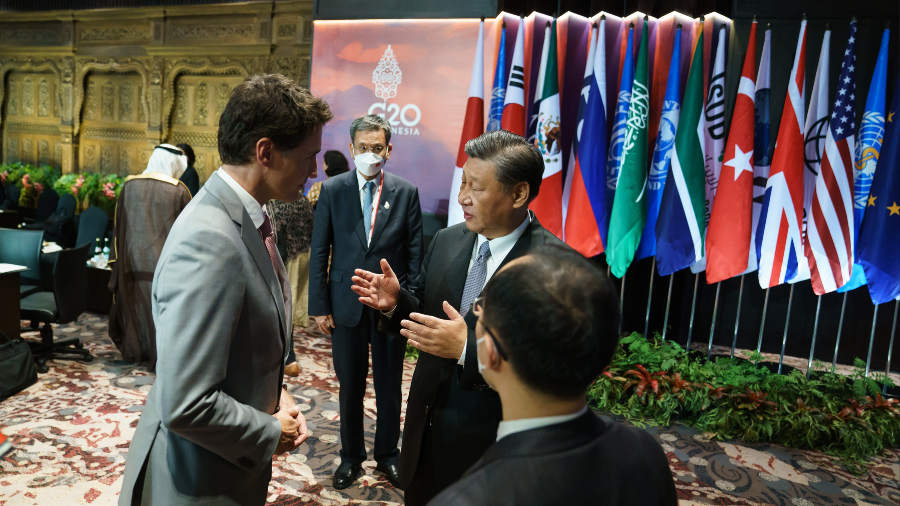This article originally appeared in the Hamilton Spectator.
By Charles Burton, May 17, 2023
As China keeps trying to menace other countries into submission, the latest bully tactics could work out for Canada.
These are not good times for Canadian politicians or businesspeople with interests in maintaining the “see no evil, hear no evil, speak no evil” charade that has characterized Canada-China relations. If anything, Beijing — which declined an opportunity to defuse the latest crisis — seems primed for confrontation.
After Chinese government security agent Zhao Wei was outed in the Canadian news media for allegedly interfering with Canada’s affairs and harassing family members of MP Michael Chong, Prime Minister Justin Trudeau gave the Chinese Embassy a week to gracefully withdraw Zhao, who was based in China’s Toronto consulate.
When Beijing balked, Ottawa expelled Zhao as persona non grata. China’s predictable tit-for-tat came within hours when veteran Canadian diplomat Jennifer Lynn Lalonde was ordered to leave the country.
The threat is clear: If Canada and others don’t ignore their security agencies’ calls for action against Chinese meddling in third countries, Beijing will inflict economic consequences and perhaps do appalling things to expatriates in China. Canadians know this well.
But “making us pay” could have unexpected results. If China slashes purchases of Canadian exports, our surplus inventory would sell at lower prices on world markets. Those exports become more competitive, attracting new buyers, diversifying Canada’s export markets and reducing our reliance on China. That’s a positive economic shift for Canada.
Any further odious abuses like what happened to Kovrig and Spavor will fully inflame Canadian fury against China, not just in Parliament but across the country.
In a time of cementing Canada’s values and identity, and taking actions that reassure wary allies of our resolve, there are other moves Ottawa can move quickly on.
The federal government can stop stalling on enacting foreign agents’ legislation (FIRA) that legitimately deters China and others from using bribes or technology to corruptly manipulate our democratic foundations.
Ottawa can also put serious momentum into its Indo-Pacific Strategy, announced last November in part to appease U.S. concerns about Canada’s reliability in countering China. Ian McKay was appointed “Special Envoy on the Indo-Pacific,” but the announcement said McKay will also continue as Canada’s Ambassador to Japan. The Indo-Pacific region is becoming the planet’s most critical theatre for everything from trade to energy stability to global security; surely Canada needs somebody full-time to shepherd this major policy alignment. (The fact that Ottawa also has a string of 17 assistant deputy ministers assigned, on a very part-time basis, to help implement the strategy tells us message that the Indo-Pacific file is well down Canada’s to-do list.)
But while the government may be more focused on virtue signals than addressing Canadians’ concerns over Beijing’s routine flouting of international law, there are signs the feds might finally strengthen Canada’s half-hearted engagement of China’s disruptions of Canadian values of justice and democratic transparency.
One notable political turning point came when the prime minister’s national security adviser, Jody Thomas, recently contradicted both the PM and Public Safety Minister Marco Mendicino, who had said the CSIS file on Zhao Wei’s activities was withheld from them by CSIS. Ms. Thomas bravely dismissed the injustice that CSIS alone should take the hit for Zhao and his ministry of state colleagues being allowed to continue their intimidation and espionage.
The government has said Special Rapporteur David Johnston will put all this to rest when he issues his assessment on May 23, but he is hardly the person to initiate a reset of Canada’s engagement of China.
We need a Canadian China policy that gets past partisan sniping during question period. Ironically, Beijing overplaying its hand with retaliations could be cause for optimism for the future of Canada-China relations, if it results in Canada getting serious about China’s evolving threat to our security.
Charles Burton is a Senior fellow at the Macdonald-Laurier Institute, nonresident senior fellow of the European Values Centre for Security Policy in Prague and former diplomat at Canada’s embassy in Beijing.






